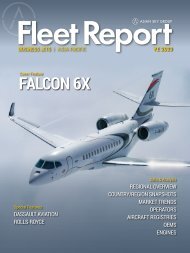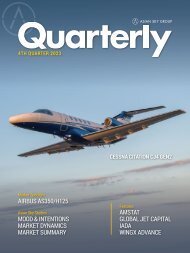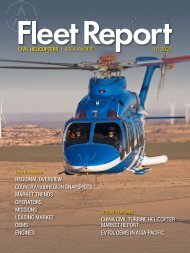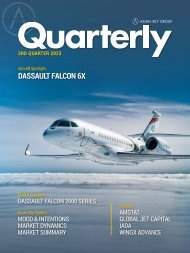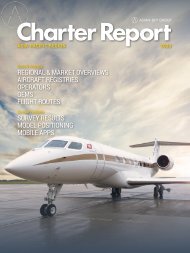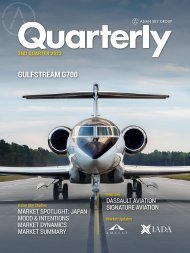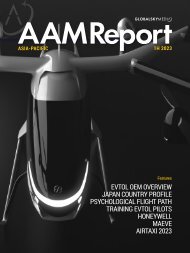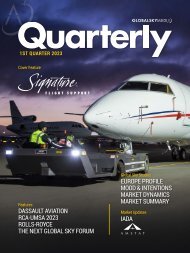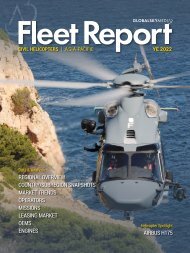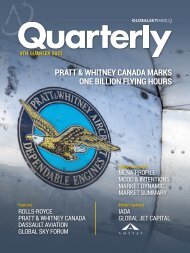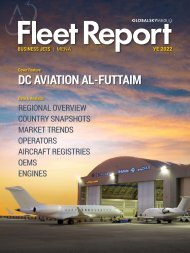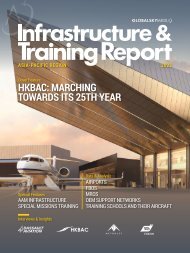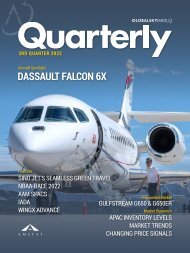Asian Sky Quarterly 2021Q1
Create successful ePaper yourself
Turn your PDF publications into a flip-book with our unique Google optimized e-Paper software.
COMMENTARY: CLYDE & CO<br />
Existing Transactions<br />
in Pressure Circumstances<br />
Testing Relationships and Contracts<br />
The pandemic has tested the relationships of banks/financiers<br />
and aircraft managers/operators in numerous ways, both as between<br />
themselves and with their owner/borrower customers. It is<br />
not uncommon for defaults to first occur under a management<br />
agreement between an operator and the aircraft owner, before<br />
the owner/borrower defaults under its financing arrangements.<br />
It is also not uncommon for tell-tale problems to surface many<br />
months or even years before any action is taken. If the aircraft is<br />
financed, then it is likely that a manager/operator will be unable<br />
to exercise a lien over the aircraft in competition to the financier.<br />
If a default then occurs under the financing, a bank/financier is<br />
likely to have to act quickly and repossess and sell the aircraft<br />
to protect its interests. It is at this point that relationships and<br />
contracts really matter. Banks/financiers need the help of managers/operators<br />
to locate and safeguard the aircraft, whether to<br />
exercise self-help remedies or to enforce court orders. Managers<br />
and operators, who may well be owed substantial management<br />
fees and costs by then, will not want to be required to incur further<br />
costs without pay.<br />
(b) if they are costs incurred by a party at the direction of another<br />
party and whether that (or another) party is responsible for<br />
those costs; and<br />
(c) what time period the costs apply to (for example, before or<br />
after the relevant default), and whether any indemnities or other<br />
costs provisions cover those costs over that time period;<br />
(iv) if a party is permitted or restricted from taking legal proceedings<br />
against any other party; and<br />
(v) if a party has any right to terminate or suspend any of the transaction<br />
contracts or arrangements (including under their own contracts<br />
and those of other parties) and the ability of other parties<br />
to do so.<br />
When reviewed in the context of a particular default and the practical<br />
circumstances existing at that time, some parties may find<br />
the legal requirements of the documentation are at odds with their<br />
preferred way to manage or resolve the situation. They will need to<br />
proceed carefully to ensure they maximise their own best interests,<br />
whilst protecting their commercial relationships and complying<br />
with their own contractual obligations.<br />
Upon the occurrence of a default situation, most banks/financiers<br />
and managers/operators will typically review the legal requirements<br />
of the transaction documentation governing their<br />
relationships. Common contractual clauses which are typically<br />
relevant in these circumstances include provisions governing:<br />
(i) the extent to which the parties are required or permitted to<br />
provide and exchange information concerning other parties (particularly<br />
the owner/borrower), the aircraft and the circumstances<br />
of the default;<br />
(ii) whether, and to what extent, a party must either<br />
(a) coordinate their proposed actions with another party, or<br />
(b) follow the instructions of another party to take particular<br />
actions;<br />
(iii) whether any fees, costs or expenses (collectively referred to<br />
here simply as ‘costs’) of a party are recoverable in circumstances<br />
where the owner/borrower does not pay. There are usually<br />
multiple aspects to consider and analyse regarding these provisions,<br />
including:<br />
(a) the type of costs incurred (for example, if the costs are<br />
incurred by a manager/operator, whether they are aircraft-related<br />
costs or service-related costs, and whether different types of<br />
costs are treated differently under the documentation);<br />
Defaults and Recovery Actions<br />
Tensions commonly escalate due to default situations being handled<br />
by some parties differently in practice from how the transaction<br />
documentation anticipated it would be handled. This divergence<br />
is not surprising, bearing in mind that the documentation<br />
was probably agreed in a different practical context – i.e., at a time<br />
when there were no problems and when banks/financiers and managers/operators<br />
may have had an idealistic view that problems<br />
would be handled in a fully transparent and cooperative manner as<br />
between themselves. It is not uncommon for parties to have loosely<br />
assumed at the time of entering a transaction that, if problems<br />
did arise, then there would be<br />
(i) a free flow of ‘perfect information’ between the parties,<br />
FIRST QUARTER 2021 — ASIAN SKY QUARTERLY | 17



